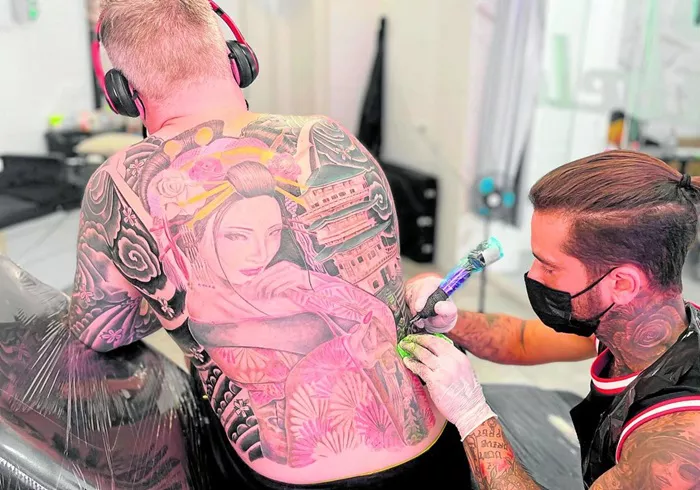Despite the growing popularity of tattoos, the tattoo industry on Costa del Sol is facing a period of stagnation, largely due to the rise of illegal competition. Tattooists with minimal training are operating from private homes, bypassing strict health regulations and undercutting legitimate businesses with significantly lower prices.
These unlicensed tattoo artists, who avoid studio rent and official registration, are able to offer services at a fraction of the cost. However, this comes at the expense of client safety, as these operations often fail to adhere to the necessary hygiene and sterilization standards required by law.
Miguel Ángel Gálvez, also known as ‘McCoy,’ is the president of the National Union of Professional Tattooists and Piercers (Untap) and the owner of Tattoo Stone, the oldest studio in Malaga, established in 1994. Gálvez highlighted the growing issue of illegal tattooists, noting that for every legitimate studio in Malaga, there are five unlicensed tattooists working from residential properties. This trend is also evident in Seville, with Madrid reportedly facing an even worse situation.
“When we opened our studio, there was only one foreign tattoo artist in Torremolinos, and we were the first Spaniards to do so,” said Gálvez. “The market has expanded significantly, but now we are seeing a decline in revenue, while costs keep rising. Illegal tattooing is a serious problem.”
The situation reflects the broader changes in the tattoo industry. Once seen as a practice for subcultures like punk or rockabilly, tattoos have become mainstream. Gálvez pointed out that today, individuals from all walks of life, including professionals like surgeons and judges, are opting for tattoos. This shift is partly due to the change in tattoo styles, with fine lines and smaller pieces gaining popularity.
In contrast to the unlicensed artists, professional tattooists in established studios undergo extensive training. This process includes completing detailed health and safety courses, followed by apprenticeships with seasoned mentors. In addition, these professionals are skilled in drawing and artistic techniques, which sets them apart from those who take short courses that often lack a comprehensive focus on artistic ability.
“Now, people are being told they can tattoo after just a few days of training, without needing to know how to draw,” said Gálvez. “But when they try to open a studio and fail, they turn to illegal flats. In a legal business, every tattoo involves significant costs for sterilization and hygiene. But those working from flats use unsafe materials and don’t follow proper sterilization protocols.”
The rise of illegal tattooing has sparked concerns among legitimate tattoo professionals, who have raised the issue with local authorities. However, Gálvez stated that these unlicensed operations continue to thrive with little oversight, while legal studios remain subject to regular health inspections.
“The risks to clients are serious,” Gálvez warned. “Hepatitis can survive on the skin for weeks, and poor hygiene practices increase the likelihood of transmission.”
Alberto Ramírez, known as ‘Fido,’ manages Fido Tattoo in Mijas, a studio that has been open for 24 years. While his business is considered a local reference, Fido noted that many clients still seek out illegal tattoo artists to save money, despite the risks.
“People are being told that they can become tattoo artists with just a quick course. But you can’t learn a profession in a week,” Fido said, stressing the importance of proper vocational training.
Fido also addressed misconceptions about tattoo safety, noting that in his 24 years of experience and 16,000 tattoos performed, he has never encountered issues with pigments or serious complications.
Tomy Loeb, manager of TNT Marbella, a studio that has operated since 1999, reflected on the lost apprenticeship phase in the industry. Loeb, who trained for two years under a strict mentor, emphasized the importance of dedication to the craft. “Now, young people want to learn everything in a month,” he said.
Loeb’s studio caters to a high-end clientele, with many customers flying in for tattoos from abroad, where prices are considerably higher.
One area of the tattoo business that has seen significant growth is tattoo removal. Loeb attributed this surge to the influence of social media and the rise of unlicensed tattoo artists, with many individuals seeking to remove tattoos they regret or no longer feel comfortable with.
The growth of illegal tattooing on Costa del Sol highlights an ongoing struggle for the legitimate tattoo industry, as professionals continue to push for more regulation and enforcement to ensure the safety and quality of the service provided to clients.
Related topics:

